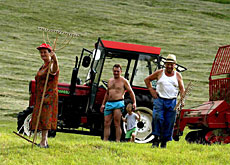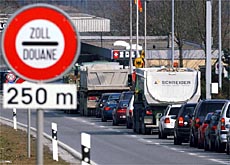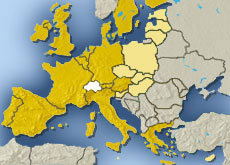Swiss farmers fear lower prices as EU expands

When the European Union admits ten new members on May 1, the number of farmers in the EU zone will grow by almost four million overnight.
But the biggest challenge facing Swiss farmers is the lifting of export subsidies and the dismantling of trade barriers, which will have far-reaching consequences.
“EU enlargement will have no immediate impact on Swiss agriculture,” Christian Häberli of the Federal Office for Agriculture told swissinfo.
“Far more significant will be the impact of the agriculture accord between Switzerland and the EU, and of the negotiations within the World Trade Organization ministerial conference.”
The agriculture agreement with the EU will be implemented over the next three years. The WTO talks are continuing and no agreement is likely to come into effect before 2006.
Vodka and cheese
After Switzerland rejected membership of the European Economic Area in 1992, it went on to agree multilateral agreements with eight of the ten new EU member countries.
These agreements ease customs duties on Swiss imports. But after May 1, agricultural produce from these eight countries will be taxed at the full rate.
“This means that, for example, Polish vodka will – for a time – be more expensive in Switzerland,” explained Häberli.
But the accord between Switzerland and the EU will gradually remove all customs duties on agricultural produce, including cheese – the biggest market.
Over the next three years the agriculture agreement foresees a complete opening up of the cheese market. Customs duties and export subsidies will be scrapped.
The Federal Office for Agriculture expects the result to be increased pressure on the price of milk in Switzerland.
“Milk producers will have to reduce their price to the EU level in the medium term,” said Häberli.
Question of quality
Switzerland’s number two retailer, Coop, shares the view that EU enlargement will not have a major impact on the Swiss agriculture sector.
“Nine of the countries are net importers and if they do manage to capture a market share it will be in the EU first of all,” the Coop’s Sibyl Anwander told swissinfo.
“These countries also have a huge amount of catching up to do in terms of quality,” said Anwander.
But she warned that EU enlargement would lead to lower prices in the medium term and would accelerate the pace of change in Swiss farming.
The Swiss Farmers Union admits it is concerned about the pressure that enlargement will put on prices.
“But on the other hand we will also benefit from new markets,” union official Heidi Bravo told swissinfo.
“These countries are becoming more attractive markets, particularly for high-quality cheese, because they also have population groups with high purchasing power.”
New markets
But Bravo also cautioned that EU enlargement and the opening up of the cheese market would bring certain risks.
She said Swiss farmers would have to become more entrepreneurial and position themselves in niche markets.
“Switzerland is not an ideal place, either from a topographical or a climatic point of view, for a liberalised agriculture sector.”
But Swiss farmers can count on some state help as they face the challenges ahead.
The government is providing SFr14 billion ($11 billion) over the next four years within the framework of its Agriculture Policy 2007.
swissinfo, Andreas Keiser
On May 1, Estonia, Latvia, Lithuania, Hungary, Poland, the Czech Republic, Slovakia, Slovenia, Cyprus and Malta will join the European Union.
With the exception of Hungary, these countries are all net importers of agricultural produce.
Last year Switzerland imported agricultural products to the value of SFr7.05 billion, and exported SFr1.52 billion worth.
69% of agricultural imports came from EU countries, while 76% of Swiss agricultural exports were to the EU.
In 2003 the ten future EU members accounted for 2% of total Swiss exports and 2.9% of imports.

In compliance with the JTI standards
More: SWI swissinfo.ch certified by the Journalism Trust Initiative


You can find an overview of ongoing debates with our journalists here. Please join us!
If you want to start a conversation about a topic raised in this article or want to report factual errors, email us at english@swissinfo.ch.